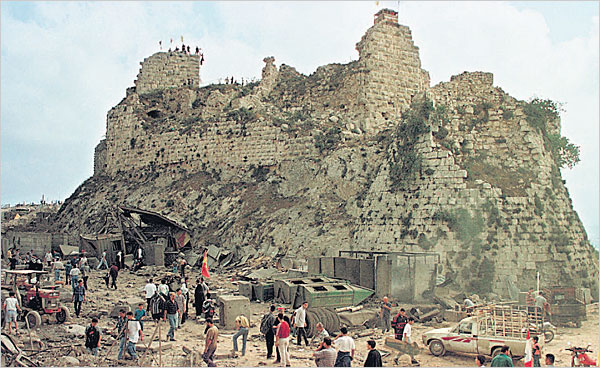Beaufort Castle after the Israeli withdrawal from Lebanon in 2000.
Ahmed Mantash/Associated Press
BEAUFORT
By Ron Leshem.
Translated by Evan Fallenberg.
360 pp. Delacorte Press. $24.
Beaufort Castle, built by crusaders on a mountaintop in what is now southern Lebanon, passed through many hands before being captured from the P.L.O. by invading Israeli troops in 1982. In this gritty first novel, the young Israeli journalist Ron Leshem imagines the tedium and terror of a small group of soldiers inside the fortress walls in the months leading up to the Israeli Army’s withdrawal in 2000.
The story is told by Liraz Liberti, an impulsive 21-year-old Sephardic officer who has been put in charge of the little band. He recalls “the feel of the wind up there, the taste of the schnitzel, and the smell of Lysol,” as well as the “five-foot-tall wet thistles that bury you.” It is through Liraz that we meet the 13 “human puppies” in his squad, young men without combat experience who spend their time inventing slang and making “killer cheese toasts with pesto.”
The unit’s tour of duty feels a bit like Zionist summer camp until the soldiers are shelled during a predawn ambush. Liraz doesn’t cope well on the battlefield: when a roadside mine explodes in the face of his bomb expert, Liraz berates the attending medic, then collapses in shock while the corpse is loaded onto a stretcher.
As Israeli public opinion turns against the war and soldiers along the front lines are picked off by enemy fire, the mission begins to seem increasingly futile. Rather than preventing Hezbollah from raiding the Israeli border, the fort has become just another target. “We sit up here at Beaufort,” the medic explains, “disconnected from everything, drawing rockets and mortar shells and explosive devices, endangering our lives, just so we can continue sitting at Beaufort.”
What began as a game of capture the flag has become a sort of Masada. Even after Liraz learns that Israel never meant to take the mountain in the first place, he remains committed to defending it. But this isn’t because he buys the “embarrassing mix of Zionism and kitsch” that passes for patriotism at Beaufort; it’s because his men have risked their lives for him and he wants to do the same for them.
The novel requires some stamina on the part of the reader. The authentic details of gear and slang, drawn from Leshem’s extensive interviews, weigh down the plot. And it’s not easy to tolerate the soldiers’ hunger for easy Orthodox girls, their scorn for dovish Israeli reporters and their lack of interest in the Lebanese whose lives have been disrupted by the fighting. But Liraz has a certain vulnerable charm, and this is what pulls the reader through.
When “Beaufort” was first published in Hebrew, the Israeli soldiers who read it might have paid scant attention to its prediction that they would eventually return to Lebanon. The enemy, Leshem’s narrator argues, will “take a soldier hostage, commandeer a jeep at the border fence, bombard some northern settlement with mortar shells. ... We’ll march in there, ... pass from house to house.” This is essentially what happened when war broke out again in the summer of 2006.
Reading the novel now, in Evan Fallenberg’s expert translation, as Israel is under pressure to go back into Gaza, one is reminded how easily an army can find itself trapped in enemy territory, sunk, as one general puts it to Liraz, “deep in tactics, without strategies.”
Jascha Hoffman has written for The Boston Globe and Nature as well as The Times.
